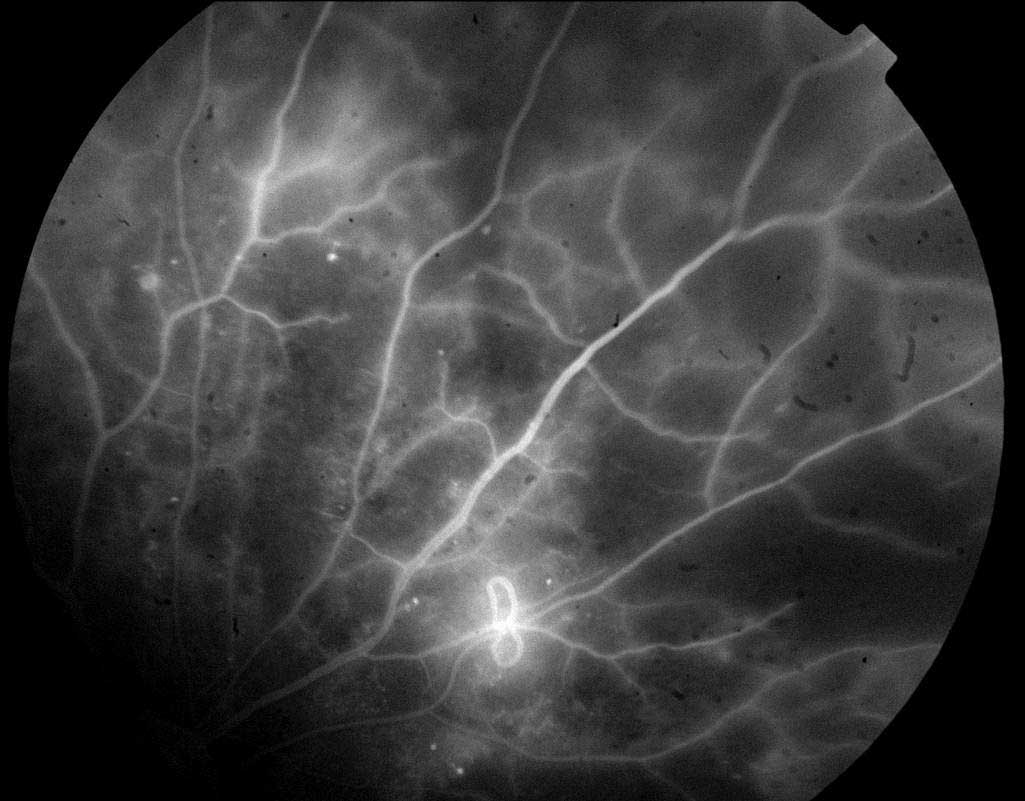
›› PATIENT EDUCATION
Here's some educational information for patients:
- Age-Related Macular Degeneration
more...
- This is a condition causing slow damage to the macula, which is the part of the retina that provides the clarity of your vision. Dry macular degeneration is the slowly progressive form of the disease which can in some cases benefit from high-dose vitamins to further slow the progression. You should consult with your ophthalmologist or retina specialist to see if these vitamins are right for you. Wet macular degeneration is an aggressive form of macular degeneration that can cause you to lose your vision in a matter of weeks to months and it is recently treatable with intraocular injections. Our practice provides monitoring of dry macular degeneration and intraocular injections for wet macular degeneration.
Radio show audio on Macular Degeneration
- Amsler grid - Important screening tool for your eye health
(does not substitute for a full eye exam)
Download PDF...
Radio show audio on Amsler Grid
- Diabetic Retinopathy
more...
- Uncontrolled diabetes causes slow damage to blood vessels and nerve tissue throughout the body. This includes the retina which is the "nerve tissue" of the eye, and damage to the retina is referred to as diabetic retinopathy. The primary treatment for diabetic retinopathy to prevent further damage is improved diabetic control with proper diabetic diet, exercise(as directed by your primary care physician), and medications. In relatively advanced cases of diabetic retinopathy treatment with laser, intraocular injections, or even surgery may be required. Please consult with your ophthalmologist or retina specialist to see if you may have signs of diabetic retinopathy. Our practice provides diabetic retinopathy laser treatments(Focal laser and panretinal photocoagulation). We also provide vitrectomy surgery for advanced diabetic retinopathy with vitreous hemorrhage(bleeding in the eye) or tractional retinal detachment(retinal detachment due to scar tissue formation in the eye).
Radio show audio on Diabetic Retinopathy
- Retinal Vein Occlusions
more...
- Retinal vein occlusion(central or branch) is a blockage of the venous circulation of the retina which causes poor oxygenation(ischemia) and swelling of the retina (macular edema). Many cases of retinal vein occlusion are treatable to restore vision. This condition can cause varying degrees of vision loss from mild blurred vision to almost complete vision loss. Our office provides intraocular injections and laser to treat macular edema(swelling of the retina) and retinal neovascularization(excess growth of blood vessels) due to retinal vein occlusion.
- Cystoid Macular Edema
more...
- Swelling of the retina which is often related to cataract surgery causing varying degrees of vision loss. Cystoid macular edema is treated with steroid and NSAID eye drops or in persistent cases with ocular injection of steroid.
Radio show audio on Macular Edema
- Retinal Detachment
more...
- This is in most cases a spontaneously ocurring condition where the vitreous gel of the eye pulls on the retina and causes tearing and retinal detachment. If untreated this will lead to complete vision loss. Some cases of retinal detachment are caused by trauma or ocular surgery. Retinal detachment must be treated with surgery in a timely manner to preserve or restore vision. Our practice provides scleral buckling and vitrectomy surgery for repair of retinal detachment. We can also treat many cases of isolated retinal tearing with laser or cryotherapy treatment in the office.
Radio show audio on Retinal Detachment
- Choroidal Nevus
more...
- This is a condition with overgrowth of pigment occurring behind the retina in the pigmented choroid layer of the eye. This condition is essentially the same as having a "mole" on the skin, except that you are unable to monitor for changes in size of the lesion without the assistance of an eye doctor to examine the lesion. Our practice will monitor this condition with retinal exam and photography. Ocular ultrasound is required in select cases to monitor the thickness of the lesion.
- Central Serous Chorioretinopathy(CSR)
more...
- CSR is characterized by leakage of fluid under the retina which leads to distortion and blurred vision. This condition often occurs at times of high stress. Most cases will have a full recovery of vision over a few months. Select cases are treatable with laser in the office to restore vision more quickly.



Did you know...
Retinal cryopexy (retinal cryotherapy) is used to treat retinal breaks; to destroy areas of ischemic retinal tissue; and to induce regression of retinal neovascularization (particularly if the surgeon feels that laser photocoagulation treatment cannot be administered); to directly destroy abnormal retinal blood vessels that are causing visual loss (for example, in Coats' disease); and to destroy small intraocular tumors (for example, selected retinoblastoma tumors.
INFORMATION

The optic nerve carries signals generated by the photoreceptors (cones and rods).
Each photoreceptor is joined to the optic nerve by a tiny nerve branch.
The optic nerve is connected to nerve cells that carry signals to the vision center of the brain, where they are interpreted as visual images.





